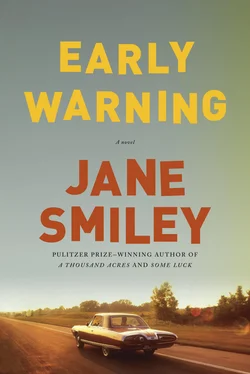Jane Smiley - Early Warning
Здесь есть возможность читать онлайн «Jane Smiley - Early Warning» весь текст электронной книги совершенно бесплатно (целиком полную версию без сокращений). В некоторых случаях можно слушать аудио, скачать через торрент в формате fb2 и присутствует краткое содержание. Год выпуска: 2015, Издательство: Knopf, Жанр: Современная проза, на английском языке. Описание произведения, (предисловие) а так же отзывы посетителей доступны на портале библиотеки ЛибКат.
- Название:Early Warning
- Автор:
- Издательство:Knopf
- Жанр:
- Год:2015
- ISBN:нет данных
- Рейтинг книги:5 / 5. Голосов: 1
-
Избранное:Добавить в избранное
- Отзывы:
-
Ваша оценка:
- 100
- 1
- 2
- 3
- 4
- 5
Early Warning: краткое содержание, описание и аннотация
Предлагаем к чтению аннотацию, описание, краткое содержание или предисловие (зависит от того, что написал сам автор книги «Early Warning»). Если вы не нашли необходимую информацию о книге — напишите в комментариях, мы постараемся отыскать её.
, a national best seller published to rave reviews from coast to coast.
Early Warning — читать онлайн бесплатно полную книгу (весь текст) целиком
Ниже представлен текст книги, разбитый по страницам. Система сохранения места последней прочитанной страницы, позволяет с удобством читать онлайн бесплатно книгу «Early Warning», без необходимости каждый раз заново искать на чём Вы остановились. Поставьте закладку, и сможете в любой момент перейти на страницу, на которой закончили чтение.
Интервал:
Закладка:
“In a way.”
Lillian opened her bag and pulled out the letter. When she handed it to him, he glanced at it and said, “I know that.”
“What are you going to do about it?”
“Take the courses over.”
“You aren’t worried?”
He shook his head, then groaned.
“Are you okay? Is everything okay?” He looked like himself, tall and supple, unshaven, his hair a ragged mess, but handsome anyway. She realized that this was a question he could not answer, at least to her. If everything was not okay, then had she and Arthur failed? If everything was okay, would her concern push Tim into everything’s not being okay? And maybe everything that she was seeing now was just the way Tim had been for years, on his own, doing what he wanted, and letting them think that everything was okay. Lillian began to feel dizzy. She said, “You want lunch or something?”
“Can’t eat.”
“Tell me this is a hangover.”
“This is a hangover.”
“What time did you go to bed?”
“Stop asking, Mom.”
She stopped asking. She got up and walked around the room, picking up this shirt and that sweater, folding them, setting them on the dresser. Tim rolled over onto his stomach. She stood regarding him for a minute or two, and then walked out. By the time she got to the car, she was too dizzy to drive, so she sat in the front seat of the Mustang for a long time, and only pulled away when a man in a uniform peered at her through the window. She drove back, as she had thought she would, seeing nothing but Tim in her mind, sacked out and empty in his messy room, and got home before Arthur did. When he came in, he barely said a word. She fed Dean and Tina hamburgers and baked potatoes; Debbie was going out for the evening, and Lillian was too sad to eat. Arthur stayed in his office.
—
IT WAS TRUE that Dave Courtland had a nose for oil — even if he didn’t know what he was smelling, he couldn’t stay away from it. He had bought the one field that Fremont had been developing carefully now for eight years, six of those with Frank’s and Jim Upjohn’s help. But he had bought another field, too, three years before that, and only on a whim. They hadn’t developed it, because a geologist had said, “Well, cattle might do well on it.” Dave didn’t know why he’d bought it. But now the geologists found oil there, too, and plenty of it, light crude.
Jim Upjohn said that what he and Frank had to do with Dave was shake their heads in a thoughtfully negative way, as if there were simply too many things undecided about the whole Venezuelan venture. Sun was if possible even more avid than Getty for what they’d found in the new field, because of their numerous grades of gasoline. The Sun rep wooed Frank by taking him to the Tabac Club, on the Upper West Side. They went in, stripped down in the locker room, and then discussed Dave’s oil field while lying on tables being hosed with hot water, strapped with fibrous whips, hosed again; then they were off to the steam room. The guy never stopped asking questions. The Humble Oil rep only took him to lunch. Jim Upjohn thought that if Frank played this properly, Dave Courtland could walk away with three or four times what he had put into Fremont. Sun had it right: hundred-octane gasoline? If you were driving a Ford Thunderbolt, quarter-mile in eleven and three-quarters seconds, that’s what you needed. And the stock market was inexplicably shooting upward — Frank had to laugh when he read the article in the Times on his way to work: “The market has proved once again that it can behave just as mysteriously as a woman.” (Of course he pictured Lydia, but he thought of Andy, too.) “Everybody tries to figure out what it is going to do, but, heeding some inexplicable inner logic, it goes right ahead and pulls a surprise.” The Dow, which had bottomed out at around 840 in May, had hit 942.65 on Monday. Now it was Wednesday, and it had retreated a hair, to just over 940, and nineteen million shares traded. No one had ever seen such a thing before. He read on. “ ‘Columbus would have been amazed,’ one broker declared yesterday.” Frank said, “Hey, Tony, looks like we’re rich.”
“Maybe so, boss,” said Tony.
Frank continued reading the article, and decided to take some of Uncle Jens’s money out of color TVs and Pan Am and put it back into steel and utilities. The article said that the solider stocks were going to follow the glamour stocks upward, and Frank believed that to be the case. Then he read that LBJ’s gallbladder operation was considered a thing of beauty.
At the office, there were four calls from Jim Upjohn already. Jim wasn’t impatient — he never was — he just told Frank exactly what to do. Call Hal first, and get him out of bed. Jim had seen him at a party the night before, at the Public Library, and he was so blitzed he couldn’t find his shoes—“Or his feet,” said Jim Upjohn. “He needs to get up early and ponder his sins.” Then call Friskie. Friskie would have been up all night. Friskie read four newspapers, which affected his mood, always for the worse. The stock market was higher than it had ever been? Well, then, it could only fall. “He’ll want to sell before ten a.m.,” said Jim Upjohn. Jim himself, with the backing of the board, would be phoning Dave. Frank should call a meeting in the head office, and do a lot of frowning and worrying, and then, within a day or two, Jim said, “Everyone will be dragged, kicking and screaming, feet first, into nirvana.”
“What’s that?” said Frank.
“A version of heaven on earth where money is no object.”
Frank was looking at a nice severance package and yet another mysterious new job. Jim Upjohn said it was in weapons manufacture. Weapons were booming now. Frank felt a little nostalgia for his life at Iowa State, that job he’d had for three years, those fruitless attempts to make gunpowder out of cornstalks. He expected to enjoy weapons, and he did truly wonder what all those weapons manufacturers had learned from the trove of German papers and patents he had spent two years after the war sorting and translating. Perhaps weapons had always been his destiny.
Frank went into his private bathroom and looked in the mirror. He was forty-five. He looked a little like Grandpa Otto, though taller, thinner, and colder. He kept his hair short, and because he was graying, there was no distinct contrast between his hairline and his hair; anyway, he knew how to buy a hat and how to wear one. His jawline had sharpened, and his cheekbones, too. All he had left were the blue eyes. Lydia, whose own eyes were brown, often stared at them as if they amazed her. Frank straightened his tie.
The deal, so long in the making, was done by Friday, and Frank was out of his office by five. He felt a little startled by the speed of it. All he carried out was his briefcase, and that was nearly empty. The Sun people told him to leave his files and his secretary. His secretary, happy to still have a job, promised to send his other things home in a box — a picture of Andy and the kids, a raincoat, an umbrella. That was all.
Frank got in a taxi and went straight to the Belvedere Hotel. He hadn’t seen Lydia in a month. Of course, he hadn’t called her or warned her. They did not communicate in that way. Once in a while, they left messages for one another at the Belvedere, but what Frank really counted on was walking into the bar there and seeing her across the room. They had gone a month before — most recently when Olivier took her to France in August. One of the pleasures of their romance, for Frank, was treating these unexpected separations as if they were disappearances, replays of that first disappearance followed by the exhilarating, predestined reunion. She was not at the Belvedere, and there was no message. The bartender offered, without being asked, that he hadn’t seen her in two, three weeks.
Читать дальшеИнтервал:
Закладка:
Похожие книги на «Early Warning»
Представляем Вашему вниманию похожие книги на «Early Warning» списком для выбора. Мы отобрали схожую по названию и смыслу литературу в надежде предоставить читателям больше вариантов отыскать новые, интересные, ещё непрочитанные произведения.
Обсуждение, отзывы о книге «Early Warning» и просто собственные мнения читателей. Оставьте ваши комментарии, напишите, что Вы думаете о произведении, его смысле или главных героях. Укажите что конкретно понравилось, а что нет, и почему Вы так считаете.











